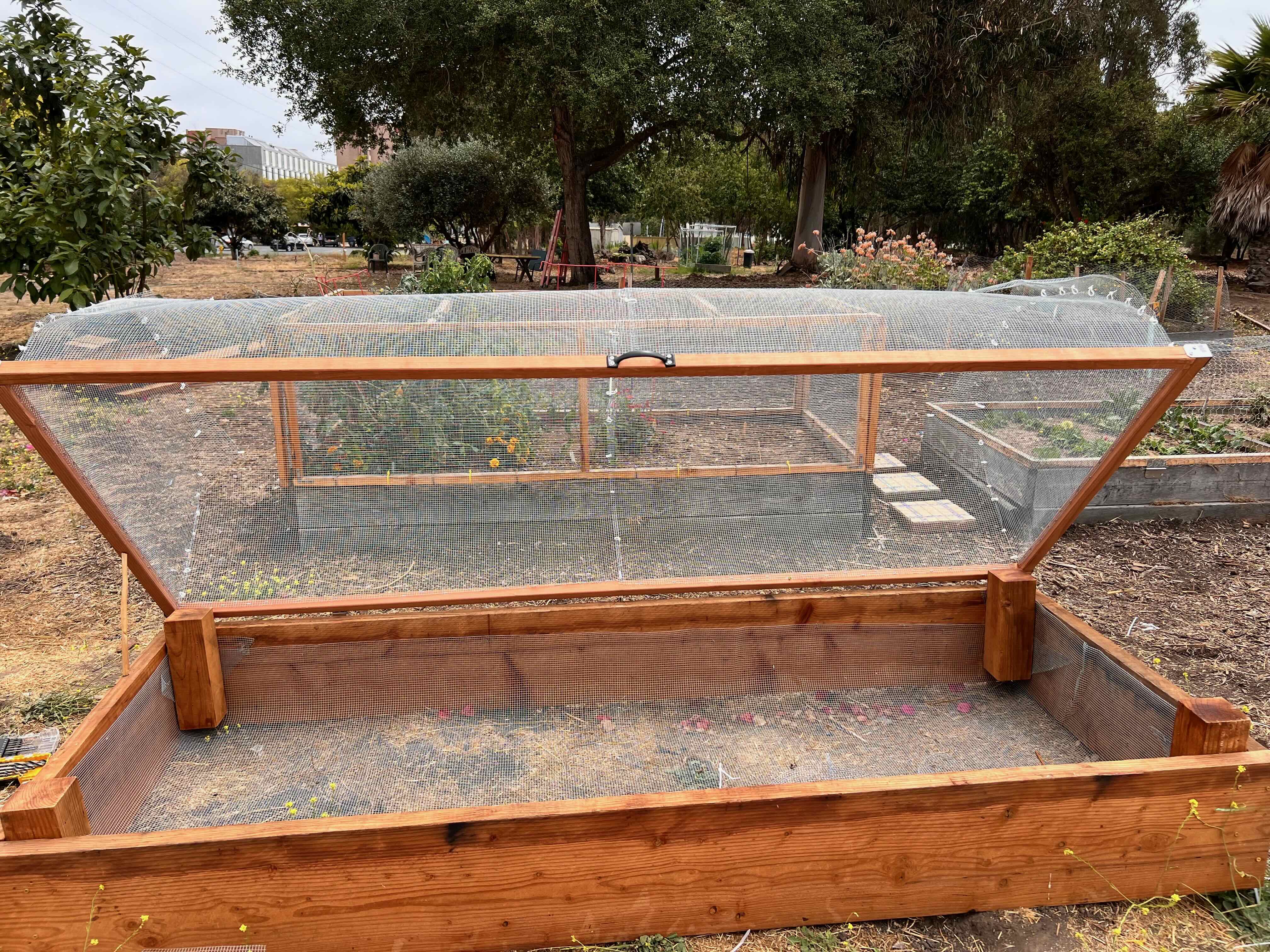Goals
An essential goal of this project is raising awareness on the ways in which gardening has an impact on the surrounding coastal ecosystem. The hope is to promote community improvement through education by involving Family Housing residents in hands-on workshops and coastal habitats. This can foster appreciation for local wildlife and empower future generations with knowledge of gardening practices that are mindful of coastal ecosystem protection.
Brandon and his team aim to remove the remaining deteriorating plastic debris from garden spaces and transform the Family Student Housing gardens into cleaner, safer environments for the community and wildlife. This will be done by installing alternatives to bird netting that are instead made from wood and metal, which will protect growing produce from animals that might eat them. Brandon plans to develop a maintenance plan in collaboration with other garden leadership teams to keep these practices in place beyond the initial implementation. Producing efficient workshop materials and garden cage blueprints will allow future garden teams to continue offering workshops on metal cage construction and coastal-friendly gardening for years to come.
Deliverables
Outcomes/Metrics
The following goals will be accomplished while the project is active:
- Install 60 metal garden cages and build 8 bird habitats for the Family Student Housing Gardens
- Involve at least 180 Family Student Housing residents in workshops and tours
- Host 12 workshops (6 at each garden) and 6 bird-watching and coastal habitat tours (3 at each garden) for a total of 18 events hosted throughout the year
The wildlife appreciation tours will encourage participants to observe and understand the local wildlife impacted by current gardening practices, which will strengthen the connection between community members and the surrounding local ecosystem. Though the project will only be active during the 2025-26 school year, Garden Coordinators and Membership Coordinators for Family Student Housing will use the new infrastructure that is built through this project as the new standard for garden beds and will create a new model that gardeners can use.
About
This project aims to implement and promote coastal ecosystem-friendly pest management practices at Family Student Housing gardens at Storke and West Campus. Brandon Aoki and his team intend to address the unintentional consequences of bird netting in our coastal community while also raising awareness and celebrating local ecosystems. Bird netting, frequently used in gardens due to its low costs and ability to keep pests out, is extremely harmful to the environment. It frequently traps and harms wildlife and eventually degrades into microplastics, which can infiltrate the dirt and ocean and contaminate sea creatures. To remedy this, Brandon is creating garden cages that are made of hardwire cloth for the affected communities, allowing access to sunlight and nutrients while keeping out squirrels and other pests from gardens. This alternative to plastic garden cages will directly reduce harm to wildlife and improve the current conditions of the garden spaces.
Brandon’s project will reform commonly used gardening techniques that contribute to harming surrounding ecosystems. This will be done by hosting a series of educational workshops throughout the school year that will educate the UCSB community on implementing sustainable practices into gardening. The workshops will mainly focus on instructing participants on how to construct durable, wildlife-friendly cages as an alternative to bird netting. Participants will also participate in workshops on coastal ecosystem-friendly garden practices, such as reducing water pollution through organic gardening. In addition, Brandon will host wildlife appreciation tours at each garden location that will encourage participants to observe and understand the local wildlife impacted by current gardening practices, strengthening the connection between community members and the coastal ecosystem.
Partners
- Edible Campus Program
- Cheadle Center
- Santa Barbara Audubon Society
Funders
- This project is funded by the Associated Students Coastal Fund. Funding had been allocated and granted for one year, during which the project and all its components must be completed.
- Once complete, the best practices from this project will be woven into the ongoing operations of the Edible Campus Program.
Project Leads
- Brandon Aoki
Ways to Get Involved
Contact the Volunteer Coordinator for the Edible Campus Program (ECP): sa-ecpvolunteer@ucsb.edu
